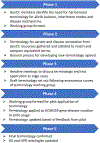Toward robust clinical genome interpretation: Developing a consistent terminology to characterize Mendelian disease-gene relationships-allelic requirement, inheritance modes, and disease mechanisms
- PMID: 37982373
- PMCID: PMC11039201
- DOI: 10.1016/j.gim.2023.101029
Toward robust clinical genome interpretation: Developing a consistent terminology to characterize Mendelian disease-gene relationships-allelic requirement, inheritance modes, and disease mechanisms
Abstract
Purpose: The terminology used for gene-disease curation and variant annotation to describe inheritance, allelic requirement, and both sequence and functional consequences of a variant is currently not standardized. There is considerable discrepancy in the literature and across clinical variant reporting in the derivation and application of terms. Here, we standardize the terminology for the characterization of disease-gene relationships to facilitate harmonized global curation and to support variant classification within the ACMG/AMP framework.
Methods: Terminology for inheritance, allelic requirement, and both structural and functional consequences of a variant used by Gene Curation Coalition members and partner organizations was collated and reviewed. Harmonized terminology with definitions and use examples was created, reviewed, and validated.
Results: We present a standardized terminology to describe gene-disease relationships, and to support variant annotation. We demonstrate application of the terminology for classification of variation in the ACMG SF 2.0 genes recommended for reporting of secondary findings. Consensus terms were agreed and formalized in both Sequence Ontology (SO) and Human Phenotype Ontology (HPO) ontologies. Gene Curation Coalition member groups intend to use or map to these terms in their respective resources.
Conclusion: The terminology standardization presented here will improve harmonization, facilitate the pooling of curation datasets across international curation efforts and, in turn, improve consistency in variant classification and genetic test interpretation.
Keywords: Allelic requirement; Disease mechanisms; Gene curation; Inheritance modes; Ontology.
Copyright © 2023 The Authors. Published by Elsevier Inc. All rights reserved.
Conflict of interest statement
Conflict of Interest James S. Ware has received research support or consultancy fees from Myokardia, Bristol-Myers Squibb, Pfizer, and Foresite Labs. All other authors declare no conflicts of interest. For the purpose of open access, the authors have applied a CC BY public copyright license to any Author Accepted Manuscript version arising.
Figures


Update of
-
Towards robust clinical genome interpretation: developing a consistent terminology to characterize disease-gene relationships - allelic requirement, inheritance modes and disease mechanisms.medRxiv [Preprint]. 2023 Apr 3:2023.03.30.23287948. doi: 10.1101/2023.03.30.23287948. medRxiv. 2023. Update in: Genet Med. 2024 Feb;26(2):101029. doi: 10.1016/j.gim.2023.101029. PMID: 37066232 Free PMC article. Updated. Preprint.
References
-
- Richards S, Aziz N, Bale S, et al. Standards and guidelines for the interpretation of sequence variants: a joint consensus recommendation of the American College of Medical Genetics and Genomics and the Association for Molecular Pathology. Genet Med. 2015;17(5):405–424. 10.1038/gim.2015.30 - DOI - PMC - PubMed
-
- Riggs ER, Andersen EF, Cherry AM, et al. Technical standards for the interpretation and reporting of constitutional copy-number variants: a joint consensus recommendation of the American College of Medical Genetics and Genomics (ACMG) and the Clinical Genome Resource (ClinGen). Genet Med. 2020;22(2):245–257. 10.1038/s41436-019-0686-8 - DOI - PMC - PubMed
Publication types
MeSH terms
Grants and funding
- WT223718/Z/21/Z/WT_/Wellcome Trust/United Kingdom
- U24 HG006834/HG/NHGRI NIH HHS/United States
- T15 LM007124/LM/NLM NIH HHS/United States
- 222883/Z/21/Z/WT_/Wellcome Trust/United Kingdom
- WT200990/Z/16/Z/WT_/Wellcome Trust/United Kingdom
- U24 HG011449/HG/NHGRI NIH HHS/United States
- FS/CRLF/21/23011/BHF_/British Heart Foundation/United Kingdom
- 220540/Z/20/A/WT_/Wellcome Trust/United Kingdom
- MC_UP_1102/20/MRC_/Medical Research Council/United Kingdom
- 107469/Z/15/Z/WT_/Wellcome Trust/United Kingdom
- U24 HG009650/HG/NHGRI NIH HHS/United States
- WT_/Wellcome Trust/United Kingdom
- 200990/A/16/Z/WT_/Wellcome Trust/United Kingdom
- 220134/Z/20/Z/WT_/Wellcome Trust/United Kingdom
LinkOut - more resources
Full Text Sources
Medical

